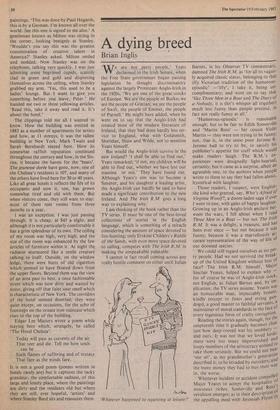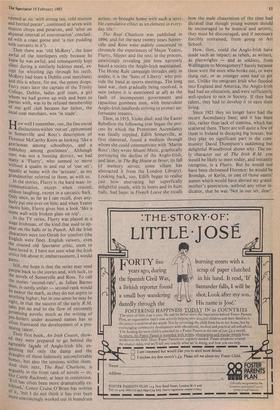A dying breed
Brian Inglis
'We are not petty people,' Yeats declaimed to the Irish Senate, when the Free State government began passing legislation he thought discriminatory against the largely Protestant Anglo-Irish in the 1920s. 'We are one of the great stocks of Europe. We are the people of Burke; we are the people of Grattan; we are the people of Swift, the people of Emmet, the people of Parnell.' He might have added, when he went on to say that the Anglo-Irish had created most of the modern literature of Ireland, that they had done hardly less ser- vice to England, what with Goldsmith, Sheridan, Shaw and Wilde, not to mention Yeats himself.
But would the Anglo-Irish survive in the new Ireland? 'I shall be able to find out,' Yeats remarked; `if not, my children will be able to find out, whether we have lost our stamina or not.' They have found out. Although Yeats's son was to become a Senator, and his daughter a leading artist, the Anglo-Irish can hardly be said to have made a significant contribution to the new Ireland. And The Irish R.M. goes a long way to explaining why.
I am thinking of the book rather than the TV series. It must be one of the best-loved collections of stories in the English language, which is something of a miracle considering the amount of space devoted to fox-hunting; only Erskine Childers's Riddle of the Sands, with even more space devoted .to sailing, competes with The Irish R.M. in making the unspeakable palatable.
I cannot in fact recall coming across any really hostile comment on either until Julian
'Whatever happened to repenting at leisure?'
Barnes, in his Observer TV commentary, damned The Irish R.M. as 'for all its vague- ly acquired classic status, belonging to that iffy Victorian tradition of the humorous- episodic' —'iffy', I take it, being un- complimentary; and went on to say that 'like Three Men in a Bow and The Diary of a Nobody, it is (let's whisper all together) much less funny than people pretend, in fact not really funny at all.' `Humorous-episodic' is reasonable enough; but to be fair to Edith Somerville and 'Martin Ross' — her cousin Violet Martin — they were not trying to be funny; not, that is, in the sense poor Jerome K. Jerome had to try to be, to satisfy his publisher's appetite for stuff which would make readers laugh. The R.M.'s ex- periences were designedly light-hearted, certainly; but it came as a surprise, albeit an agreeable one, to the authors when people wrote to them to say they had fallen about, hysterical with laughter. Those readers, I suspect, were English: the kind who greeted, say, Who's Afraid of Virginia. Woolf?, a doom-laden saga if ever I went to one, with gales of happy laughter. Growing up in an Anglo-Irish enclave bet- ween the wars, I fell about when I read Three Men in a Boat — but not The Irish R.M. It was a delight, a treasure, and has been ever since — but not because it was funny; because it was a marvellously ac- curate representation of the way of life of our doomed species.
We could still regard ourselves as no pet- ty people. Had we not survived the break- up of the United Kingdom without loss of face? The Irish R.M. himself, Major Sinclair Yeates, helped to explain why — for of course he was of Anglo-Irish stock, not English, as Julian Barnes and, by im- plication, the TV series assume. Yeates was an honourable man, impeccably honest, kindly (except to foxes and erring Ph- dogs), a good master to faithful servants, a maintainer of moral standards in the face 01 every ingenious form of crafty corruption. Reading the stories again, though, for the umpteenth time it gradually becomes clear just how deep-rooted was his snobbery and ours. It was not that we loved lords. there were too many impoverished and loopy members of the aristocracy around to take them seriously. But we could not bear 'our set', as my grandmother's generation described it, to be invaded by outsiders; and the more money they had to buy their way in, the worse. Whenever incident or accident compelled Major Yeates to accept the hospitality 0, 1 nouveaux riches, Somerville and Ross's_ revulsion emerges; as in their 'description of the appalling meal with Jeremiah Flynn (
opened at six 'with strong tea, cold mutton and bottled porter', continued at seven with mutton chops and potatoes, and 'after an abysmal interval of conversation' conclud- ed with a roast goose and 'a rice pudding with currants in it').
Then there was 'old McRory', the least awful of the interlopers only because he knew he was awful, and consequently kept silent during a similarly hideous meal, ex- cept for whistling jigs through his teeth. McRory had been a Dublin coal merchant; and this is where, for me, the penny drops. Forty years later the captain of the Trinity College, Dublin, ladies golf team, a girl whom we had grown up with and been to Parties with, was to be refused membership of our golf club because her father, the local coal merchant, was 'in trade'.
How well I remember, too, the fine social distinctions within 'our set', epitomised in Somerville and Ross's description of Florence McCarthy Knox as looking 'like a gentleman among schoolboys, and a stableboy among gentlemen'. Although ours was not a hunting district, we had Many a 'Flurry', who seemed to move without a qualm in and out of 'our set'; equally at home with the 'artisans', as my grandmother referred to them, as with us.
In the stories, Flurry is the hard man: in- communicative, except when roused; seldom laughing, except in a sarcastic bark. Only once, as far as I can recall, does any- body put one over on him; and when Yeates taunts him, Flurry gives him a look 'like a stone wall with broken glass on top'. In the TV series, Flurry was played as a stage Irishman, of the kind that used to ap- Pear on the halls or in Punch. All the Irish Characters were too Oirish for comfort (the English were fine). English viewers, even the crusted old Spectator critic, seem to have loved it. I have not seen what the Irish critics felt about it; embarrassment, 1 would guess.
Still, my hope is that the series may send People back to the stories and, with luck, to the novels of Somerville and Ross. To call the stories 'second-rate', as Julian Barnes does, is surely unfair — second-rank would be nearer the mark, as they do not aspire to anything higher; but in one sense he may be right, in that the success of the early R.M. tales put an end to the flow of extremely Promising novels; much as the writing of Pot-boilers under assumed names has so often frustrated the development of a pro- mising talent.
Their first book, An Irish Cousin, show- ed they were prepared to go behind the agreeable faiade of Anglo-Irish life, ex- amining not only the damp and the draughts of those hideously uncomfortable homes, but also the tensions within them. And their next, The Real Charlotte, is arguably in the front rank of novels — or, like Castle Rackrent, at least in contention.
has often been more dramatically ex- hibited,' Collor Cruise O'Brien has written of it, but I do not think it has ever been more convincingly worked out in humdrum action, or brought home with such a terri- ble cumulative effect as an element in every- day life.'
The Real Charlotte was published in 1894; and for the next twenty years Somer- ville and Ross were mainly concerned to chronicle the experiences of Major Yeates, Flurry, Slipper and the rest; in the process, unwittingly revealing just how narrowly based a society the Anglo-Irish maintained. The Home Rule campaign intrudes only in asides; it is the 'Sons of Liberty' who pro- vide the band at sports meetings. The long land war, then gradually being resolved, is seen (where it is mentioned at all) as the fault of incompetent government and rapacious gombeen men, with benevolent Anglo-Irish landlords striving to protect un- fortunate tenants.
Then, in 1915, Violet died; and the Easter Rebellion the following year began the pro- cess by which the Protestant Ascendancy was finally toppled. Edith Somerville, at first shattered, found a medium through whom she could communicate with 'Martin Ross'; they wrote Mount Music, graphically portraying the decline of the Anglo-Irish; and later, in The Big House at Inver, its fall (if memory serves; some villain has abstracted it from the London Library). Looking back, too, Edith began to realise just how enervating her superfically delightful youth, with its hunts and its hunt balls, had been: in French Leave she recalls
how the male chauvinism of the time had dictated that though young women should be encouraged to be musical and artistic, they must be discouraged, and if necessary forcibly restrained, from going to Art School.
How, then, could the Anglo-Irish have made such an impact: as rebels, as writers, as playwrights — and as soldiers, from Wellington to Montgomery? Surely because these were the ones who broke out, or were stung, out, or as younger sons had to get out. Unlike the emigrant Irish who flooded into England and America, the Anglo-Irish had had an education, and were sufficiently well-spoken to mix in Society. If they had talent, they had to develop it to earn their living.
Since 1921 they no longer have had the secure Ascendancy base; and it has been this, rather than lack of stamina, which has scattered them. There are still quite a few of them in Ireland in decaying big houses, but they play no significant part in the com- munity: David Thompson's saddening but delightful Woodbrook shows why. The on- ly character out of The Irish R.M. you would be likely to meet today, and instantly recognise, is a Flurry. But he would not have been christened Florence; he would be Brendan, or Kevin, or one of those saints' names which would have alerted my grand- mother's generation, without any other in- dicator, that he was 'Not in our set, dear'.







































 Previous page
Previous page